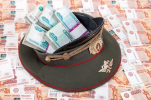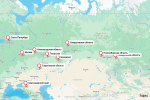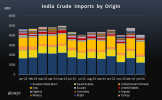Corruption is flourishing in the Russian army. Court records show that commanders demand bribes for all kinds of 'services', from keeping troops out of the front line, to allowing them to go to hospital, or even to enable men to avoid punishment for being drunk on duty.


Verstka has reviewed the offences listed in over a thousand verdicts in military bribery cases to identify patterns of corruption in the Russian army during the war in Ukraine. While corruption has always been present, it has taken new forms during the war.
It is fairly common for Russian commanders to demand bribes from their men for various 'services'. Pre-war, these included things such as:

Being allowed to take days off or go on leave

Undertaking a physical training test (which enables a salary increase)

Changing a military rank

Obtaining a category C driver’s licence, which gives the right to drive trucks

Evading punishment for using a mobile phone or drinking on duty
Since the start of the full-scale war in February 2022, the 'menu' has expanded to include more 'services':

Certificates of injury, which allow for compensation and other state benefits

Nominations for medals and awards

Avoiding combat missions
This can be very lucrative for corrupt officers. For example, a certificate of injury can cost between 150,000 and 1 million rubles ($1,671–$11,142), while being allowed to end a contract early can cost 400,000 ($4,456). Permission to go to hospital can cost 130,000 ($1,448).
Serving and ex-soldiers have commented on the persistence of corruption in the military. One Rosgvardia (National Guard) volunteer says that: "They sell holidays, they don't send people on assaults for money, and they also extort them for drunkenness.
"Well, with such commanders, I am not surprised, there is a terrible mess... The lawlessness is complete, and there is a lot of lawlessness."
He says that the Rosgvardia is much less corrupt because its members come from law enforcement backgrounds.
A spetznaz (special forces) soldier says that mobilised men and recent volunteers are the most corrupt. "Holidays, wounds, trips home, even awards can be paid for," he says.
"We had mobiks from Tula living in a neighbouring house to us in Luhansk, who had been there for months, paying to stay off the front. They sat there forever. They paid 150 [thousand] roubles a month. In their company, as I understand it, everything was on stream there.
"But then they closed the shop. [Bribes for] holidays or hospital stays – there's a lot of that now. 20-30 [thousand] roubles to go home, from 50 [thousand] roubles to go to the hospital. You'll have to pay extra for injuries."
Roman Solovyov, a mobilised soldier, was double-crossed by his commander when he paid a 40,000 ruble bribe to get out of going on a combat mission. The officer had approached him to offer him the deal and Solovyov transferred the money to the officer's wife's bank account.
However, Solovyov was still ordered to go on the mission two days later. He complained to the FSB and subsequently testified against his superior.
Another common scam is for soldiers to fight only on paper – a variant of the famous 'dead souls' scam, which Gogol wrote about back in 1842. In one example, 11 soldiers bribed their commander to list them in the order of battle for an attack but to be allowed to stay behind.
The bribe consisted of the purchase of a KavkazSuvenir picnic set costing 20,000 rubles ($222) for the commander's wife, which she picked up from a delivery point. One of the soldiers was later convicted of bribery; it's not clear what happened to the commander.
'

Commanders have also been convicted for issuing certificates of injury for fictitious wounds. (Ironically, soldiers with real wounds have had to resort to bribery or legal action to get the certificates they are entitled to.)
The case of platoon commander Evgeniy Rybalchenko is a good illustration of this. He issued certificates in exchange for 5-10% of the recipients' injury compensation, and received 450,000 rubles ($5,013) from two soldiers for this 'service'.
Similarly, the the head of the personnel department of the Volgograd Garrison, Andrei Gorshenev, took bribes for expediting the notoriously slow process of issuing injury certificates. Gorshenev and Rybalchenko were both jailed and heavily fined.
Many soldiers have been fined for paying what appears to be a standard fee of 2,000 rubles ($22.28) to avoid punishment for using their mobile phones at the front. This is a highly risky practice, as mobile phone signals can be used to locate defensive positions.
Bribes for being allowed to take time off are also very common. The standard fee appears to be between 1,000–2,500 rubles ($11.14–$27.86), but this can go up to as much as 60,000 ($668) for major holidays such as New Year.
In one example, a contract soldier serving in Luhansk complained in November 2023 that his unit was not being allowed to go on leave unless they paid bribes.
"We were supposed to go on holiday with the guys on the 23rd," he said. "All the documents were agreed, but at the last moment all leave was cancelled. They said that no one was going anywhere until mid-February.
"The situation is that our immediate commander has organised a scheme for himself and we can negotiate with him for money to go on leave after all! Many people are ready to pay, but my boys and I are not ready, because it's complete bullshit."
Some mobilised soldiers have even bribed officers to obtain medals and awards, to the disgust of professional soldiers. A spetsnaz soldier says: "Moscow mobiks bought themselves military medals last year. This is fucking rock bottom. I would just whip the fuck out of them.”
In one instance that resulted in a conviction, Alexander Kipyachkin took a bribe of 300,000 rubles ($3,342) to add a soldier to a list of applicants for a state award. The soldier did actually receive an award but Kipyachkin was caught by the FSB and given five years in jail.
Those who receive bribes have tended to receive fairly severe punishments, but those who give bribes rarely appear to be punished harshly and are mostly only fined. They are shown leniency particularly if they are combat veterans or donate to charity before a hearing.
Source:
https://verstka.media/kakie-uslugi-mozhno-kupit-v-voyskah-rf-vo-vremia-voyny








 Being allowed to take days off or go on leave
Being allowed to take days off or go on leave


